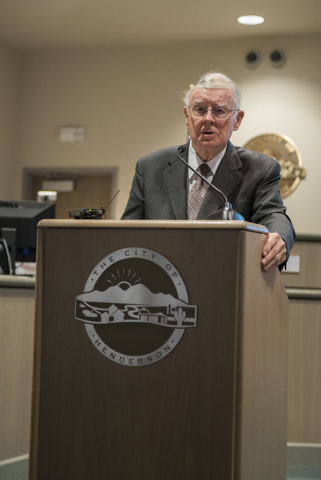Henderson safety: Specialty courts serve as problem-solving programs to break the cycle
In part three of a four-part series, Henderson View explores various city departments and resources that contribute to the community’s overall safety and Henderson’s listing as one of the safest cities.
Air Force veterans John Lomboy and James Walsh stand before Judge Mark Stevens in Henderson’s Veterans Court to receive their graduation certifications.
Once facing misdemeanor charges, the men agreed to complete a yearlong treatment program. In return, their cases were dismissed and records sealed.
“This journey has been extremely challenging, not only with the program but also my personal growth,” Lomboy said. “It made me grow as a person, and I want everyone else in treatment now to keep an open mind and get through it. It’s a blessing, and I’m very appreciative.”
Henderson’s specialty courts serve as problem-solving programs designed to help break the cycle of substance abuse, criminal activity and juvenile delinquent behavior.
VETERANS COURT
The Veterans Court helps veterans clear misdemeanor charges and transition back into society through counseling and mentoring.
“It’s for the veterans coming home with (post-traumatic stress disorder), traumatic brain injuries, alcohol and drug use, etc.,” Stevens said. “Our goal is to get them counseling and what they need to get back to being productive citizens.”
The program runs about one to two years and utilizes services offered by the VA Southern Nevada Healthcare System and Las Vegas Vet Center. Participants must agree to attend counseling, submit to random drug and alcohol testing and complete community service and/or a work program under the city’s Alternative Sentencing department.
“We also use mentors, who are veterans, to a great extent,” Stevens said. “The mentors help navigate them through counseling and apply for college or jobs. Sometimes they’re just someone to confide in.”
Stevens started the Veterans Court after a public defender, who was a Vietnam veteran, suggested they start a treatment program.
“Since I was a veteran as well, I agreed to do it,” Stevens said. “I think two days later, we had our first two candidates, and we just ran with it.”
Since 2011, about 64 veterans have graduated, and another 50 are currently receiving treatment. From 20- to 80-year-olds, the program has helped all ranks in all five military branches.
“If they want an easy way out, they should just accept the punishment for their offense and be done because this program is far more intense,” Stevens said. “That’s why it’s voluntary. You have to want to do it, or it won’t be successful.”
LIFE OF CRIME
Similar to A&E’s “Beyond Scared Straight,” Henderson Judge Diana Hampton offers the Life of Crime program to give troubled youths an insight to what life is like behind bars.
The Henderson Municipal Court, 243 S. Water St., hosts the program at 6 p.m. the second Thursday of each month except July and December. The program is free and open to all valley residents.
“It’s designed to encourage people to think before they make a decision,” Hampton said. “If you’re ready to accept the absolute worst consequences for your decision, then you’re ready to make that choice.”
The three-hour program follows two fictitious individuals named Dumb and Dumber through a series of decisions that lead to them to jail.
“In a short period of time, Dumb and Dumber go from being your average high school students to kids who are looking at felony charges,” Hampton said. “If time allows, we introduce the different departments within the police and bring in inmates to speak about what life is like in custody.”
Started in North Las Vegas by retired judge Warren VanLandschoot, Life of Crime was brought to Henderson after he asked Hampton to help expand the program.
“We wanted to follow his general recipe (for the program), but we wanted to add our own flavoring to it, so to speak,” Hampton said. “We sat with the police department and brainstormed how we could make the program unique to our jurisdiction. It was a successful meeting, and we launched the program Jan. 1, 2010.”
Although Hampton suggests that the program is appropriate for those ages 12 to 21, children as young as 8 have attended.
“The inmates can be very graphic. They don’t hold back when it comes to language or imagining what happens in jail,” she said. “It can be inappropriate for some age groups; however, we haven’t restricted it because unfortunately, there are some very young kids that need a wake-up call.
“I’ve toyed with the idea of limiting it, but I haven’t because I don’t want anyone to feel like they don’t have anywhere to go.”
Over the years, Hampton has received letters from parents, participants and inmates thanking her and explaining how the program has affected their life.
“We try to press on everyone that jail is not cool. It is not fun,” she said. “You need to think before you cross that street.”
ABC COURT
Known as ABC Court, Henderson’s Assistance in Breaking the Cycle program is designed to implement treatment for habitual misdemeanor offenders by addressing substance abuse issues, mental health treatment and life-skills training.
While individuals can ask to be considered for the program, more often, the recommendations come through the defense council, city attorney and other judges, according to Judge Douglas Hedger.
“A first-time offender doesn’t need an intensive program to get clean. They just need a judge to tell them to get counseling,” he said. “Addicts are a different situation. Telling them doesn’t affect them.”
The program lasts a minimum of a year with four 90-day phases. Participants are required to reside in sober living housing, get a job, obtain a high school diploma or GED and start a savings account to transition back into society.
Since its inception in 2008, about 34 individuals have graduated from the program, which has about a 72 percent success rate for keeping its participants out of future trouble, Hedger said.
“The program started after we saw a lot of repeat offenders being arrested for nonviolent misdemeanors, such as drugs and alcohol or being homeless,” he said. “It precipitated me to address the underlying issues and help them become more productive citizens rather than putting them back in jail.”
Hedger hosts about two group graduation ceremonies a year and provides smaller tokens of acknowledgment for individual achievements, such as sobriety or getting a GED.
“It costs the city about $107 per day to keep someone in jail compared to $7 per day to keep them in our program. We’re saving taxpayers dollars and keeping our streets free of criminals,” Hedger said. “The goal is to make and allow these individuals to be productive citizens in our community.”
For more information, visit cityofhenderson.com/municipal-court.
Editor’s note: Look for the last article of the series May 21. To read past stories, visit viewnews.com.
To reach Henderson View reporter Caitlyn Belcher, email cbelcher@viewnews.com or call 702-383-0403. Find her on twitter: @caitlynbelcher.




















